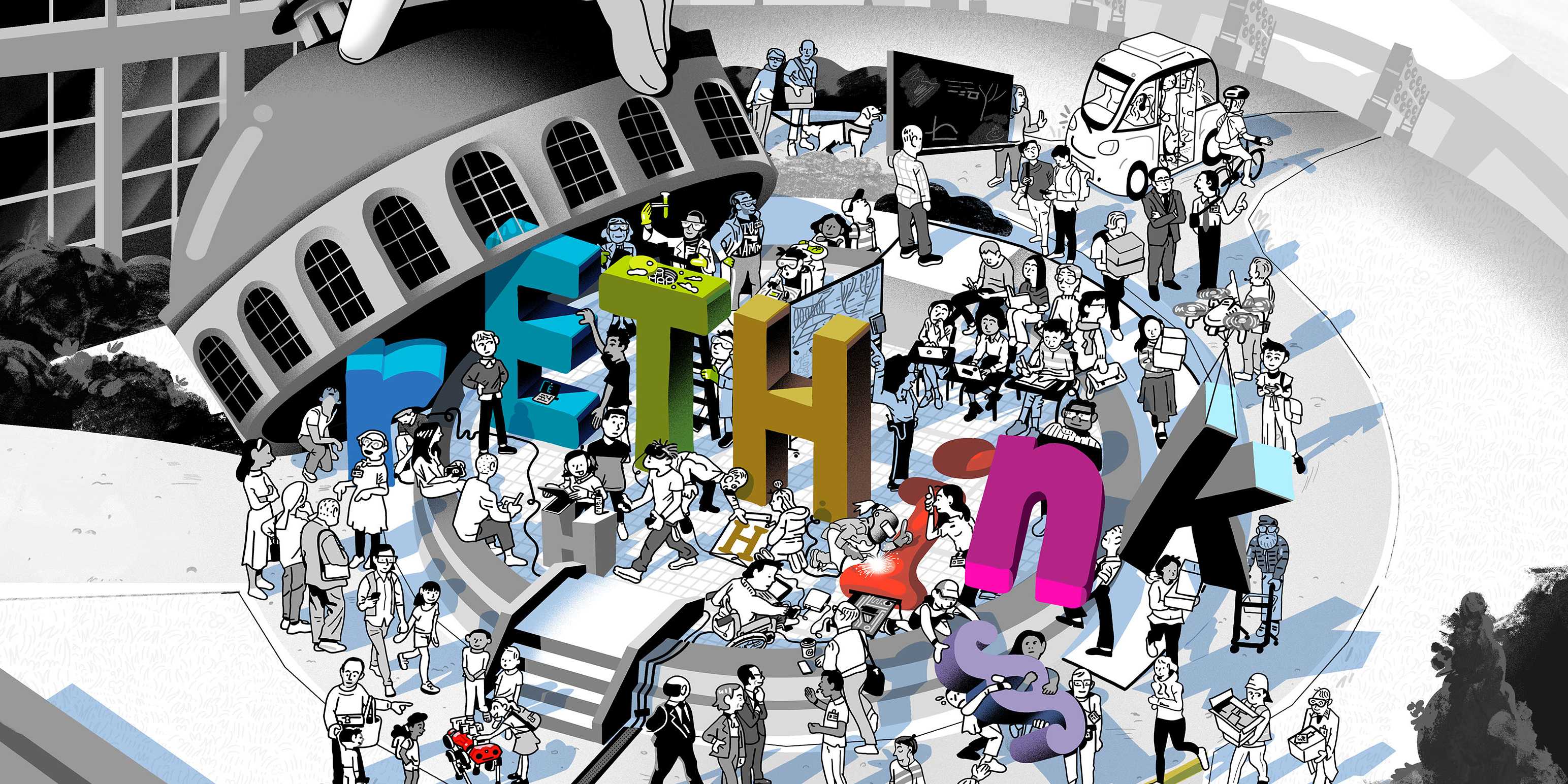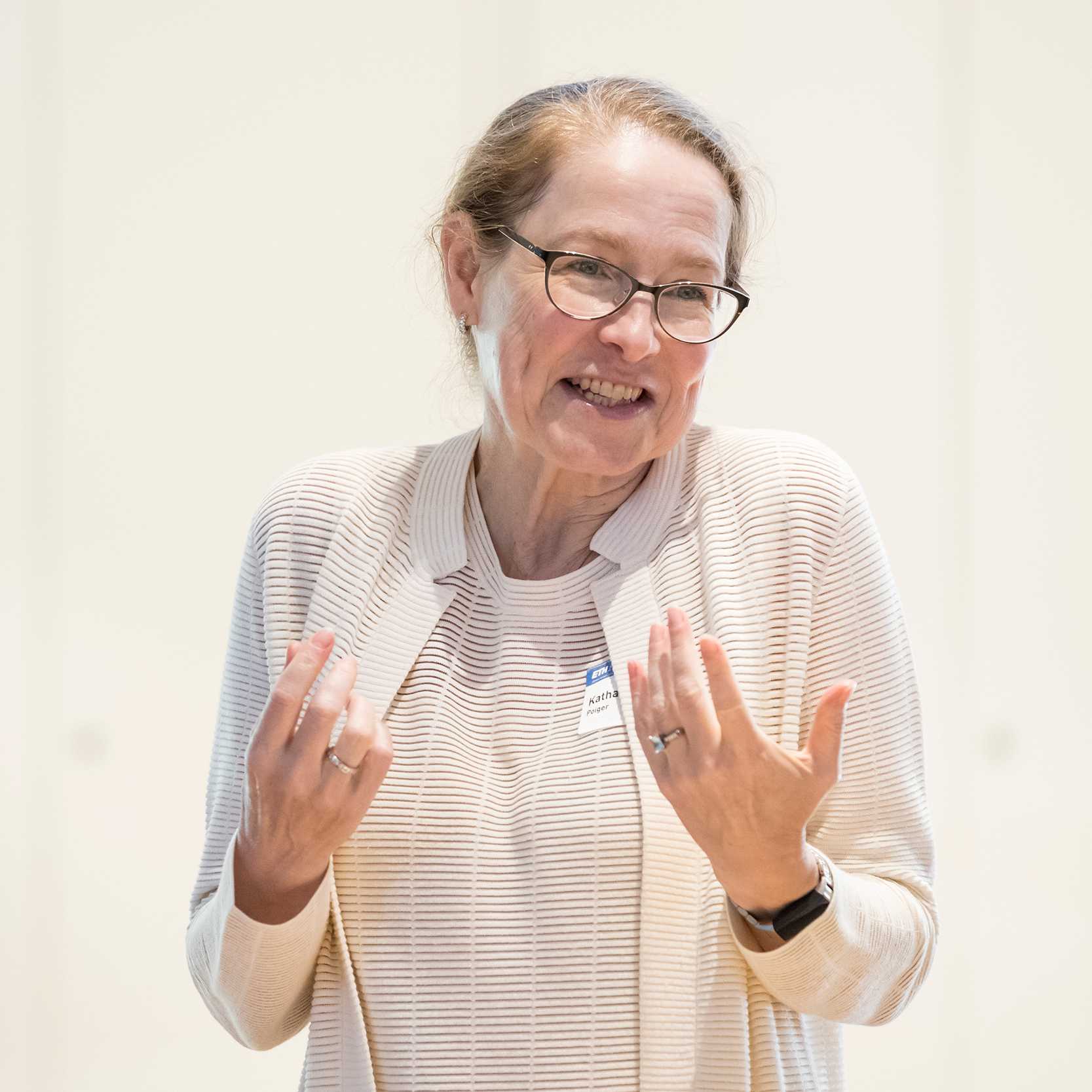“Now the changes need to stand the test of time”
The rETHink project officially concluded at the end of 2023 with the dissolution of the project organisation. We sat down with ETH President Joël Mesot, the initiator of rETHink, and Secretary General Katharina Poiger, who acted as the project leader, to learn about rETHink’s achievements and the future of organisational development at ETH.

Shortly after taking office in 2019, ETH President Joël Mesot launched an organisational development project called rETHink with the intention of futureproofing ETH and ensuring that the university remains competitive going forward. Four project objectives were formulated to achieve this: (1) Increase ownership and responsibility on all levels (2) Develop the efficiency and effectiveness of structures and processes (3) Strengthen strategic and operational leadership (4) Improve cooperation and develop values that tie the ETH community together.
Mr Mesot, rETHink was wrapped up at the end of 2023. How would you sum up the project?
Joël Mesot: I’ve continually been amazed by rETHink. Its impact on our university has far surpassed the objective that we set. When I took office as President of ETH, I saw different challenges facing the university – in connection with its growth, for instance, but also from the internal and external demands and expectations placed on us. So we needed to prepare ourselves. And many of these issues have actually become a reality over the past few years. Take, for example, the current strained financial situation: we were able to act quickly because of the intense discussions that we had during the four years of the rETHink process and the new foundation of trust that was established. This is just one concrete example of the project’s success. Once again, I would like to thank all participants from the bottom of my heart for their enormous effort. I’d also like to extend special gratitude to our dedicated external project leaders, who were with us every step of the way for four years.

“We created a general willingness and openness to change by involving members of the ETH community from all levels and all areas.”Joël Mesot, ETH President and initiator of rETHink
Ms Poiger, now that the project is concluded, what are your thoughts?
Katharina Poiger: If I'm being honest, it doesn't really feel like the end. We’re currently intensely working on integrating the solutions devised in the project into our rules and regulations, in particular the Organisational Ordinance of ETH Zurich (OV), which is being completely reworked. The revised OV will enter a university-wide internal consultation process in the spring semester and is scheduled to enter into force at the beginning of 2025. The suggested amendments would then still need to be established and take effect. However, I still agree with Joel’s assessment that rETHink is making itself felt regardless of the status of our regulations. I’m already getting questions about the ideal composition of departmental strategy committees, for example, or what the profile of a departmental coordinator should look like.
Mesot: This is an excellent example of how rETHink works. Over the past four years, we have thoroughly analysed select processes and structures at ETH and worked out proposals for concrete changes. Some of the processes have already been adapted or reestablished, while with others it’s necessary to amend the regulations beforehand. This is now being put into place. We created a general willingness and openness to change by involving members of the ETH community from all levels and all areas. This is in part attributable to a strong feeling of mutual trust that was built up via authentic dialogue. It created fertile ground for change projects that have now already been implemented or are in the process of being implemented, and also for changes that are being initiated in various units outside the scope of rETHink. This change in the culture is also going to be the basis for rETHink’s lasting impact on the university.
“We haven't yet implemented finished solutions for all of the topics that we tackled in rETHink.”Katharina Poiger, Secretary General and rETHink project leader
So does that mean that the project is not really over?
Poiger: ETH will of course continue to change and develop, as it has always done. We also haven't yet implemented finished solutions for all of the topics that we tackled in rETHink. But we've done enough work on the issues, bringing them to the point where they can continue to be developed and refined within existing structures at ETH. The end of rETHink just means that the project organisation has been dissolved, but it's not the end of our development as a university.
Let's talk about the concrete results. What stands out to you as noteworthy?
Mesot: I already touched on the cultural changes. We worked together in a broad-based participatory process with stakeholders from all university groups and drafted a set of six values intended to serve as guideposts for our collaboration at ETH – which is nothing special in itself. What's unique is that these values have been integrated into an overarching model that also includes the vision and the mission of the university as well as skills and competencies that should guide our actions. This set of skills allows us to anchor the values in the ETH culture, for instance by including the skills as a component in annual employee appraisal interviews. Last autumn we launched pilot projects for these redesigned appraisal interviews between employees and supervisors, and next year all of the interviews should include the ETH competencies.
Poiger: The prerequisite here was a central structural change. Right at the beginning of the project, the Office of the Vice President for Personnel Development and Leadership (VPPL) was created. A lot of rETHink projects have been and continue to be operationally implemented by VPPL. For me, one of the standout projects is the leadership feedback process. The concept was created by Workstream 3 and presented to each academic department in a kind of roadshow, and the feedback from that was then integrated into the project. There was a test run in 2023 with professors who volunteered, and going forward, all full professors will do a self-evaluation and receive feedback from their group once every five years as an exercise to reflect on their leadership role. Here we also had a successful pilot run that allows us to now roll out the new process. If we now connect this to rETHink’s objectives, this new process is based on taking ownership and responsibility and strengthens leadership.

“For me, one of the standout projects is the leadership feedback process, where all full professors reflect on themselves and their leadership role.”Katharina Poiger, Generalsekretärin und rETHink-Projektleiterin
Mesot: I can only agree with that. Julia Dannath, who we were able to recruit for the role of Vice President for Personnel Development and Leadership, and her team have played a key role in many of these change projects. For example, the onboarding program for new professors has been completely reworked, including new course offerings for leadership classes. Assistant professors will now receive special support for their management roles, and as part of the promotion process to full professor, VPPL conducts a values and skills-based interview with them, the results of which I receive before making my decision. But all other staff members at ETH also have access to a much wider range of continuing education courses, including new courses for leadership and management skills.
In 2020, a second new VP post was created alongside VPPL – for Corporate Relations and Knowledge Transfer (VPWW).
Mesot: For me it was important to strengthen this interface with the outside world. As a public institution that receives half of its budget from federal funding, ETH exists entirely to serve society. Vanessa Wood has done a tremendous job building up this office. She’s been able to get outstanding people on board who are currently developing innovations for companies, public administration, non-profit organisations and hospitals. And in doing so, she's been able to rely on a team with a wealth of expertise that has already done amazing work in the past. Last year there were more spin-off companies founded at ETH than ever before, which I'm very happy to report. We’re going to hear a lot from VPWW over the coming year as well.
Let's get back to the concrete impact of the rETHink project. What changes are going to shape the university?
Poiger: Earlier I spoke about changes to the Organisational Ordinance, which concerns the implementation of the reworked management model for ETH Zurich. The idea is to strengthen the dialogue, cooperation and mutual understanding between the academic departments and the Executive Board and also to bolster the dialogue between the academic departments themselves.
Mesot: For rETHink it was very important to us to promote taking ownership on all levels. While professorships enjoy extensive autonomy at ETH based on freedom of research and teaching, and the presidential setup allows me extensive decision-making liberties, we primarily had the academic departments in mind here. There will be new governing bodies that aim at strengthening self-administration and ownership within the departments. A strategy and resource committee is being established in every department with the idea of strengthening the strategic orientation both of each department individually and the university as a whole. We want to ensure more continuity in the leadership of the departments despite the rotation of department heads. That’s why we want to better prepare department heads for their roles and strengthen the departmental management committees. Departmental coordinators should now also be included in this committee.
Poiger: I’d like to mention the key word “future-oriented dialogue” and the creation of the departmental strategy committees. In order to develop ETH's future strategy, a proposal for a new committee will be submitted for internal consultation, which will include members of the Executive Board as well as department heads. This should put the strategy development process on broader footing and increase the binding nature of the strategy, rooting it more strongly within the university. Going forward, regular meetings will be held to discuss future-related topics and to exchange ideas between the departments. The first meeting of this kind, dealing with the life sciences, was already held last June. Another key element in promoting exchange between the departments and their participation in preparing important institutional-strategic decisions at ETH is transforming the current Pre-DVK into the new Conference of Heads of Department. The new DVK should be headed by a speaker and supported by a deputy.
Mesot: Turning our attention to the administration, we shouldn't forget to mention our digitalisation strategy, which was initiated as part of the rETHink project and is now being implemented. This helps our university use digital technologies to get to grips with its rapid growth.
When rETHink kicked off, there were some critics who feared a deluge of new rules and regulations. Now that the project is finished, what you have to say to them?
Poiger: Over the past few years, we have discussed, in great detail, autonomy and ownership for professorships, academic self-administration and the commitment of professors and other senior academic staff to the university. During these discussions we always had questions about new guidelines and rules. One example of this was whether ETH should introduce a fixed teaching load, as is customary at other universities, so that all professors have to do a certain amount of teaching. We made a conscious decision not to do so. We decided to leave responsibility for teaching and the allocation of teaching duties with the academic departments, strengthening “good citizenship” and ownership in the process.
Mesot: There are some new obligations, for instance when it comes to management and leadership. And regarding how departments are organised, we came to the conclusion that a certain level of uniformity is conducive to the strategic orientation of the university. But the fundamental objective of rETHink was to promote taking on responsibility and ownership, which was something that we never lost sight of. What’s more important than new rules is an emphasis on having a sharing mindset. An example: In November we launched a toolbox with over 100 tips from experienced professors regarding the duties and structure of a professorship. We hope that the toolbox will be especially useful for young professors and help them carry out their wide-ranging duties in the best way possible. For me, that’s the spirit of rETHink.
“rETHink helped us lay the basis for the changes that will bring ETH into the future.”Joël Mesot, Präsident und Initiator von rETHink
We’ve talked a lot about what rETHink has achieved. But were there any goals where the project fell short?
Poiger: There are a handful of projects where we weren’t able to work out any concrete solutions by the end of the year. One of those involves senior scientists. This has been an issue at ETH for a while now, and the university drafted and implemented a career path concept already back in 2019. But since these positions are usually tied to a professorship, there’s always the question of what happens when the professor retires. The question of how to make the position of senior scientist more attractive and how their career path concept can be applied more productively is now being discussed by the Executive Board. Alongside that there are two or three other projects that will continue to be worked on this year, like drafting guidelines for departmental management committees and coming up with an onboarding programme for department heads and deputies. All in all, we can be very satisfied with what we’ve achieved. The overall impact of rETHink will reveal itself over the coming years. As the expression goes, “The proof of the pudding is in the eating.”
Mesot: The changes of course need to stand the test of time. But there I’m optimistic. For me, the most impressive part of the project was being constantly reminded that everyone wants the best for the university. This realisation and the shared trust that has been built up over the last four years allows us to conduct lively discussions and deal with criticism. rETHink helped us lay the basis for the changes that will bring ETH into the future.
A look back at the project from participants
On behalf of hundreds of participants, eight members of ETH who played a key role in shaping the project draw a very brief conclusion.
"The way we have shaped the future of ETH together has impressed me very much: for me, rETHink is successful cultural development in action." Vice President for Personnel Development and Leadership
“With rETHink, we have opened a new chapter of team spirit, innovation and efficiency. Together we will shape the future of ETH Zurich.” Ulrich Weidmann, Vice President for Infrastructure
“rETHink provided a unique opportunity to engage with a group of exceptional colleagues willing to selflessly invest their time, energy and brilliant minds in the advancement of our institution.” Paola Picotti, Professor of Molecular Systems Biology
“The project has taught me that autonomy and subsidiarity are our greatest strengths and at the same time our greatest weaknesses.”Jan Vermant, Professor of Soft Materials
“The dialogue culture at ETH has evolved and a new dimension of participation has been achieved. This spirit should guide the future collaboration.” Christopher Sauder, Deputy President of the University Assembly
“Intentionally assessing things instead of just continuing to do them because they have always been that way - that's what we started with rETHink.” Markus Niese, VSETH
"rETHink has shown that ETH is not afraid of change. This has encouraged me to initiate important changes in teaching and launch PAKETH.” Günther Dissertori, Rector of ETH Zurich
"Dancing is difficult, but the big grey elephant ETH has become more light-footed. Our values combined with the expertise to put them into practice in everyday life are good teachers." Gudela Grote, Professor of Work and Organisational Psychology
Always up to date
Would you like to always receive the most important internal information and news from ETH Zurich? Then subscribe to the "internal news" newsletter and visit Staffnet, the information portal for ETH employees.